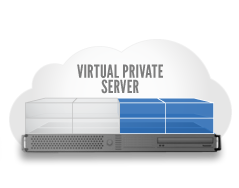What is VPS? And top 4 advantages of using a VPS

Every corporation nowadays strives to attract more customers, business models, and a strong economy. However, one of the cheapest methods to do so is to ensure the development process is as fast as possible. Companies that have seen an internet business as necessary seek to build their site rapidly, update regularly, and keep relevant and competitive. Hardly anything compares the simplicity and pace of Virtual Private Servers or VPS for the creator thinking about starting a project rapidly and efficiently, model up a site for a customer, or manage a company’s online portion.
A virtual private server (VPS) gives you a virtual network dedicated to your website while also running it on the same dedicated device like so many other websites. This is accomplished by dividing a single server into several virtual segments using virtualized resources. Hosting providers can keep their prices low while improving power, quality, and efficiency in this manner. The following are the advantages of using a VPS:
By using VPS, you can get access to your root system quickly:
Lack of accessibility to your root system is a general problem that might arise if you’re not using a VPS. Without root exposure, you should therefore depend on software applications supported by the hosting company. Unsupported software can cause security issues for hosting services because, on a shared server, the software installed is determined by the host. If the company wishes to use industry-specific programming that the host disapproves of, this will create problems and preclude the software from being used. Your company will freely enforce any required program changes inside the server by using a VPS.
VPS is affordable and reliable for your budget:
Traditionally, companies would usually choose shared hosting plans since virtual private servers were prohibitively costly to use. Moreover, as information technology has progressed, the value of web hosting has dramatically decreased, making a VPS a tool for nearly any company. Many companies provide VPS hosting plans for less than $10 a month, which is less than the cost of most shared goals.
VPS will provide you enhanced accuracy:
Except for shared hosting plans, which have hundreds, if not thousands, of others accessing and sharing the very same server as your company, a VPS would keep your company apart from other users. This is significant since websites that share a plan may be influenced by it, resulting in usability issues. For example, if a website shares the same server as your company receives a high volume of traffic, it may cause all of the sites on the server to slow down. By using a VPS, the operation of your website can never be influenced by other websites.
The resilience of using VPS:
If you hold a small company with no intentions to grow, you would be able to predict how many visitors your website may get accurately. Moreover, if you plan to grow your company, the odds are that traffic rates will rise as your client base grows, necessitating the use of a server. Apart from a server computer, which could be limited in scale, a VPS allows you to scale up the business without interacting with the server’s activity. In reality, scaling up can be as easy as modifying your web host, which usually does not entail any maintenance, so your site can keep functioning normally.
Conclusion:
With internet technology constantly evolving and many companies using the potential of the web to maximize their visibility, the need for a virtual private server is becoming a requirement. Although other web hosts, such as a network extender, are available, they may have a negative impact on the website’s functionality if traffic grows. As your company grows, a VPS can provide more versatility and scalability. Furthermore, the reasonable prices of using a VPS make this choice accessible to almost any enterprise.














